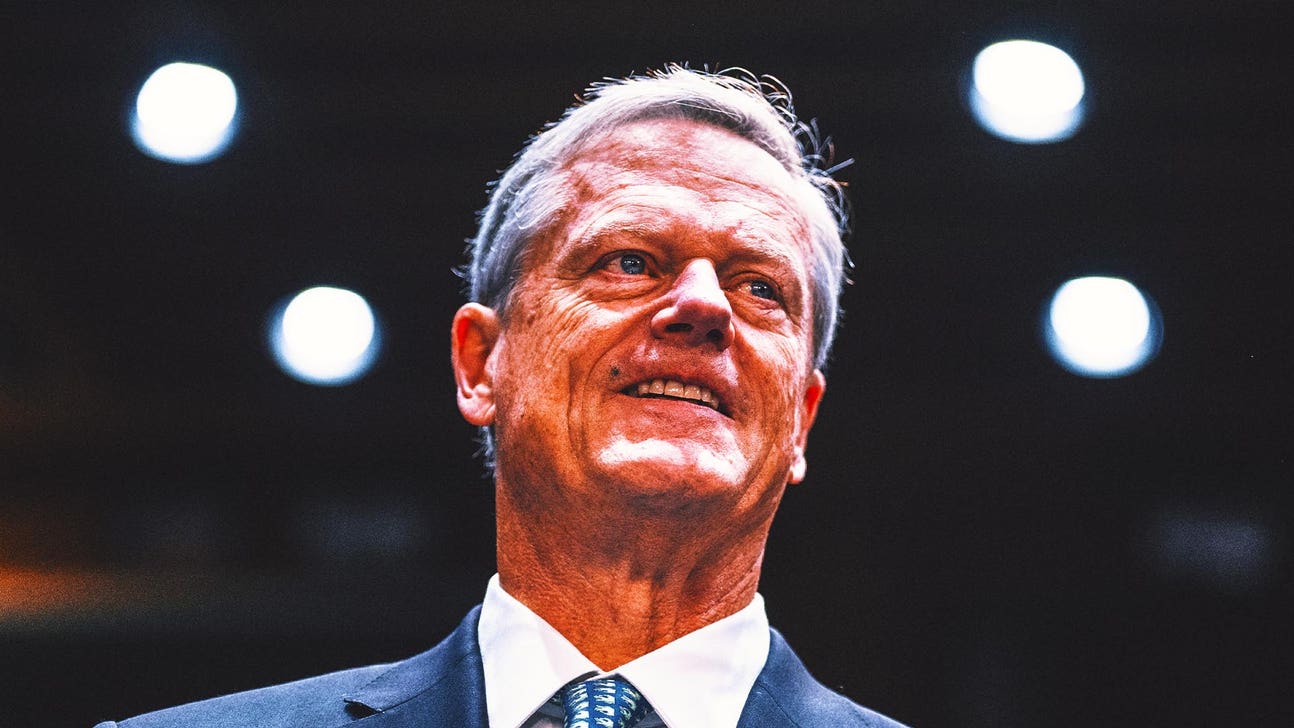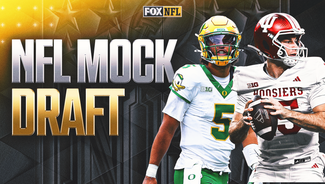
NCAA President Charlie Baker's bold plan: Bringing order to an irrational system
LAS VEGAS — College athletics is an industry based on finite results on the field, yet governed by shades of gray outside the lines.
The points count the same in every basketball game, but the method for picking postseason tournament teams is almost wholly subjective. If a player wants to transfer to a second or third school, they may not be eligible to play right away — unless they're granted a waiver based on nebulous circumstances.
When it comes to the governance of this enterprise, things become even more tedious. There is a committee for everything because there must be a committee for everything — from determining whether cream cheese on bagels is an extra benefit, to how best to approach Congress.
[NCAA president calls for new tier of Division I where schools can pay athletes]
"Right now, it's an irrational system," Sun Belt Commissioner Keith Gill said. "Trying to bring some sanity to it, trying to bring a framework to it, is really important."
Taking the first steps toward bringing some potential sanity to the current landscape, NCAA President Charlie Baker created shockwaves this week by sending a memo to hundreds of administrators outlining a bold new proposal. In it, he advocated for a brand-new subdivision within Division I that permits schools to offer more resources to their student-athletes, directly enter into name/image/likeness proposals with those on campus and, most controversial of all, directly pay players for the first time via a trust fund.
It is among the most sweeping and monumental reforms the organization has ever supported in its long history and a rare bit of proactive leadership out of the national office, which Baker has led for less than a year.
"This is an attempt to create a way to do what everybody says they would like to do, which is do more for student-athletes than they do now and in a way that is holistic and supports them and gives them opportunities to be successful both in college and beyond," said Baker in an appearance at the Intercollegiate Athletic Forum in Las Vegas. "The standard here is a fairly simple one. We're unencumbering schools in a number of ways here."
While whispers and rumors of the concepts had been circulating among NCAA membership for much of the past week, the actual memo putting pen to paper was largely met with surprise from both how broad it was and what it boldly signified.
For the first time, the NCAA has officially gone down the road of challenging the long-held third rails in college athletics, suggesting that schools directly pay players and that pursuing a level playing field for all programs is imprudent.
"There is a difference between what I would describe as the top 100 schools in terms of resources in D1, and the other 250. What happens is the NCAA ends up in one of these collisions that takes place between one-third of these schools who have the ability to do more for student-athletes — just look at their budgets — and the other 250 in pursuit of what they would call competitive equity," remarked Baker. "Once upon a time, the pursuit of competition was considered okay. It's not really anymore. In that world, we have to figure out some way to move forward."
As bold as some of the ideas contained within the proposal were, Baker's initial memo and subsequent comments prompted more questions than answers among many of the coaches and administrators gathered in Sin City for the annual College Football Hall of Fame induction and parallel Intercollegiate Athletics Forum.
In conversations with FOX Sports, several key members of NCAA committees that would potentially be tasked with turning any proposed changes into actual regulations noted that the devil would be in the details. Creating a new subdivision is no easy task, and some of the particulars of setting up trust funds for players have significant hurdles ranging from taxation to disbursement. Title IX compliance in particular looms large over it all.
Then there's the little matter of various athletic departments deciding whether they can afford to join an even more stratified section of Division I. Among those that choose to make the jump, will it be simply at a minimum commitment, or will there be pressure to keep up with athletic departments like Texas, Texas A&M and Ohio State, which regularly bring in more than $200 million in annual revenue and could soon have the opportunity to send six-figures to players in a variety of sports?
"People can do more, and people who don't want to be in this division can do pretty much whatever they want," said Baker, before getting to the heart of why the NCAA is embarking on such a bold change. "I want a little anti-trust exemption. I just want something that the NCAA and federal government agree that we are allowed to actually have an actual standard."
Whether or not an agreement can be reached with Congress on some sort of legislation giving the NCAA that antitrust exemption remains to be seen, but if not, it won't be due to a lack of effort. Baker has testified before a House subcommittee and been to Washington D.C. several times since taking the job.
The ACC's Jim Phillips stated that he was as "cautiously optimistic" as he has ever been in the pursuit of a legislative solution after a recent trip to the hill with his fellow ‘Power 4' commissioners, which included seven meetings with congresspeople on both sides of the aisle. There is hope that something can be accomplished before the end of the year, and before the upcoming election cycle really takes hold.
At the heart of the matter, and related to the core concepts advanced by Baker in his proposals, is the patchwork of state laws that have hampered any sort of national standard surrounding name, image and likeness. Currently, there are just guidelines issued by the national office, but schools have typically gone well beyond them in some areas if permissible by their local laws.
"From my vantage point, we have got to figure out a solution to what's happening with NIL," said Georgia President and Division I Board of Directors Chair Jere Morehead. "I think there is an appetite for change."
"I think we want solutions now," added Baylor President and NCAA Board of Governors chair Linda Livingstone. "I think it's clear that we have to think differently about our model for college athletics."
On that front, there is no doubt. It's how it is approached that is often where the dividing line between schools and conferences starts to become apparent.
"Why are we weaponizing the term NIL? Why not celebrate that?" Texas A&M athletic director Ross Bjork said. "Whatever market that has been created, our athletes are thriving in that market. Why are we saying this is a bad thing?"
Figuring out a federal solution regarding NIL has practical implications for the swaths of athletes, administrators and coaches it is impacting, but is also a bit of a Trojan Horse for the NCAA with the larger, looming threat of athletes being classified as employees.
There are already several lawsuits on the docket for 2024 and beyond that seek to address such issues and there's a pending complaint in front of the National Labor Relations Board that was filed against USC, the Pac-12 and the NCAA.
"It's critically important that athletes get paid and reap some of the revenue from the sport that they do," Virginia State University President Makola Abdullah said. "The issue really is compensation. If that issue is addressed well, then we can come back to this one (about athletes at employees)."
Depending on how things play out over the coming months, as these proposals are discussed further and wind their way through the byzantine NCAA legislative process, addressing that larger issue will start to come into clearer focus.
In no longer putting up a brick wall against paying players directly, however, Baker is signaling that there will be no turning back from the current path of the enterprise — and the revenues involved continue to reaffirm it is an enterprise — that he helms.
"I view it as a natural evolution of what the Transformation Committee was walking up to," said MAC Commissioner Jon Steinbrecher. "I think a lot of people are saying this is a precursor of the great breakaway, right? I would suggest exactly the opposite. It's the relief valve, it's taking the pressure valve off to do whatever institutions need to do."
How fast that valve turns remains a bit obscure and something that nobody involved in NCAA governance wanted to put a timetable on.
SEC commissioner Greg Sankey bemoaned that he felt he was running behind because he wasn't emailed Baker's proposal directly and had to find out from his league's general counsel about some of the particulars. Others cited the lack of involvement in the run-up to Monday's memo, and several conferences even banded together on Wednesday to hire outside firms to help them make their voices better heard on such matters.
Yet for all the grumbling over some of the processes that lead up to this point, the fact that most were not discussing the merits of what Baker is trying to advance and were instead picking apart particulars said plenty.
"Recognizing that we're trying to be supportive as to a big tent approach but, as you saw yesterday with Charlie's memo, there's a new reality here," Sankey said.
No longer is the NCAA sitting back. No longer is the NCAA letting others dictate their own business to them, but instead trying to take the bold step of doing it themselves amid an unprecedented era off the field.
"We have to be proactive about thinking about what's coming up next, so we can help the members deal with it," Baker remarked before distilling what his office's chief charge is moving forward. "Get stuff done!"
There's still a bit of a gray area when it comes to when or how things are getting over the finish line, but based on this week's machinations out of Indianapolis and beyond, the fact that the NCAA is even moving in that direction is increasingly becoming clear as day.
Bryan Fischer is a college football writer for FOX Sports. He has been covering college athletics for nearly two decades at outlets such as NBC Sports, CBS Sports, Yahoo! Sports and NFL.com among others. Follow him on Twitter at @BryanDFischer.










